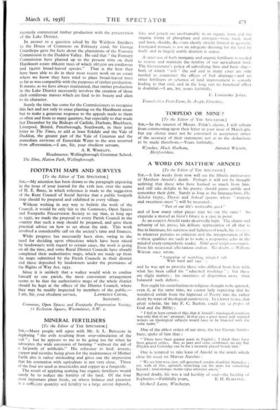A WORD ON MATTHEW ARNOLD
[To the Editor of THE SPECTATOR.] SIR,—A few weeks from now will see the fiftieth anniversary of Matthew Arnold's death. Perhaps it will not be thought
unfitting that those who have learned so much from him, and still take delight in his poetry, should pause awhile and remember their debt. Surely as long as the language lasts, The Scholar Gypsy, Thyrsis and Sohrab (poems where " majesty and sweetness meet ") will be treasured : " Part of our life's unalterable good."
and of how many other pieces may we say the same ! So exquisite a morsel as Geist's Grave is a case in point.
As an essayist Arnold ranks deservedly high. The charm and urbanity of his prose, his delicate appreciation of all that is
fine in literature, his sureness and lightness of touch, his is,,i"e(i,, in whatever pertains to criticism and the interpretation of life —these qualities are such as to wake a responsive echo in the mind of every sympathetic reader. Nihil quod tetigit rum °nitwit. Even his occasional affectations endear. No doubt, a', \X'illiain
Watson once wrote, " somewhat of worldling mingled still With bard and sage • ; and he was apt to provoke those who differed from him with what has been called his " educated insolence " ; but these are slight matters : his sweetness of disposition more than balanced such defects.
Nor ought his contributions to religious thought to be ignored, even if, at the same time, we cannot help regretting that he wandered awhile from the highroad of Poetry into the rather dusty by-ways of theological controversy. In a letter to me, that great scholar, the late F. C. Burkitt, could say (a propos of God and the Bible) :
" I feel at least certain of this, that if Arnold's theological erudition was only that of an' amateur,' in that case a great many well reputed writers on theological subjects would have to be branded with the same name."
One of the ablest critics of our time, the late George Saints- bury, spoke of him thus :
" There have been greater poets in English ; I think there have been greater critics. But, as poet and critic combined, no one but Dryden and Coleridge can be for a moment placed beside him."
One is tempted to take leave of Arnold in the words which close his essay on Marcus Aurelius :
" We see him wise, just, self-governed, tender, thankful, blameless ; yet, with all this, agitated, stretching out his arms for something beyond : tendcntemque mama ripac ulterioris amore."
Beyond doubt, his was a sad lucidity of soul—the lucidity of Orchard Lawn, Winchester.














































 Previous page
Previous page